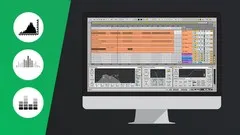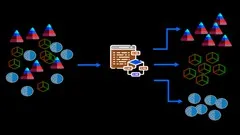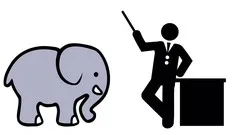
Master Cluster Analysis 2023 
Master Cluster Analysis 2023: Uncover Hidden Insights to Drive Marketing Success Discover the power of cluster analysis and unlock valuable market insights with our Master Cluster Analysis 2023 course. By understanding customer behavior and segmenting your audience based on demographics and buying patterns, you can supercharge your marketing efforts and deliver superior value. In this course, you'll learn how to craft customer profiles and conduct in-depth analyses of consumption behavior. With research-based insights at your fingertips, you'll be equipped to make data-driven marketing decisions that drive results. Whether you're a product manager, marketing professional, sales expert, or simply interested in data science, this course is ideal for anyone looking to enhance their skills in clustering methods and data analytics tools. Don't miss out on this opportunity to take your marketing strategies to the next level. Enroll in Master Cluster Analysis 2023 today! Get a comprehesive understanding of Master Cluster Analysis 2023 which is a pay course. AZ Class provides this course data for free. Learn more certificate and details here. ▼
ADVERTISEMENT
Course Feature
![]() Cost:
Cost:
Paid
![]() Provider:
Provider:
Udemy
![]() Certificate:
Certificate:
Paid Certification
![]() Language:
Language:
English
![]() Start Date:
Start Date:
2021-04-26
Course Overview
❗The content presented here is sourced directly from Udemy platform. For comprehensive course details, including enrollment information, simply click on the 'Go to class' link on our website.
Updated in [October 16th, 2023]
What does this course tell?
(Please note that the following overview content is from the original platform)
CLUSTER ANALYSISWIELD RESEARCH-BASED INSIGHTS ON MARKET SEGMENTS TO BUILD & DELIVER SUPERIOR VALUECraft customer profiles to conduct a deep dive into consumption behavior to generate foresight that aid marketing decision making.In today’s competitive world, it is crucial to understand customer behavior and categorize customers based on their demography and buying behavior. This is a critical aspect of customer segmentation that allows marketers to better tailor their marketing efforts to various audience subsets in terms of promotional, marketing and product development strategies.For example, in the case of customer data, even though we may have data from millions of customers, these customers may only belong to a few segments: customers are similar within each segment but different across segments. We may often want to analyze each segment separately, as they may behave differently (e.g. different market segments may have different product preferences and behavioral patterns).In such situations, to identify segments in the data one can use statistical techniques broadly called Clustering techniques.What will you Learn?Overview of Data AnalyticsData-Driven Market SegmentationHierarchical Clustering and K- Means ClusteringApplying Cluster Analysis to Identify and Segment MarketsMarket Segmentation Using Metric & Categorical DataTop skills you will learnClustering with Categorical DataClustering MethodsData Analytics tools & techniquesIdeal ForProduct Managers, Marketing Professionals, Sales Professionals, anyone interested in Data Science
We considered the value of this course from many aspects, and finally summarized it for you from two aspects: skills and knowledge, and the people who benefit from it:
(Please note that our content is optimized through artificial intelligence tools and carefully reviewed by our editorial staff.)
What skills and knowledge will you acquire during this course?
During the Master Cluster Analysis course, participants will acquire the following skills and knowledge:
1. Overview of Data Analytics: Participants will gain an understanding of the fundamentals of data analytics, including data collection, data cleaning, and data visualization.
2. Data-Driven Market Segmentation: Participants will learn how to use data to segment markets based on customer behavior and demographics. This will involve analyzing customer data to identify patterns and similarities among different customer groups.
3. Hierarchical Clustering and K-Means Clustering: Participants will learn two popular clustering techniques, hierarchical clustering and K-means clustering. These techniques will enable them to group similar customers together based on their characteristics and behaviors.
4. Applying Cluster Analysis to Identify and Segment Markets: Participants will learn how to apply cluster analysis techniques to identify market segments and create customer profiles. This will help them understand the different needs and preferences of various customer groups.
5. Market Segmentation Using Metric & Categorical Data: Participants will learn how to perform market segmentation using both metric and categorical data. They will understand how to handle different types of data and apply appropriate clustering methods.
6. Clustering with Categorical Data: Participants will gain expertise in clustering techniques specifically designed for categorical data. They will learn how to handle variables with multiple categories and incorporate them into the clustering process.
7. Clustering Methods: Participants will become proficient in various clustering methods, including hierarchical clustering, K-means clustering, and other advanced techniques. They will understand the strengths and limitations of each method and when to use them.
8. Data Analytics tools & techniques: Participants will learn how to use data analytics tools and techniques to perform cluster analysis. They will gain hands-on experience with popular software and programming languages used in data analytics, such as R or Python.
This course is ideal for product managers, marketing professionals, sales professionals, and anyone interested in data science.
Who will benefit from this course?
This course on Master Cluster Analysis 2023 will benefit individuals in various professions and with different interests. Specifically, it will be beneficial for:
1. Product Managers: Product managers can use cluster analysis to understand customer behavior and preferences, allowing them to develop and tailor products that meet the specific needs of different customer segments.
2. Marketing Professionals: Marketing professionals can utilize cluster analysis to identify and segment markets based on customer demographics and buying behavior. This enables them to create targeted marketing campaigns and strategies that resonate with specific audience subsets.
3. Sales Professionals: Sales professionals can benefit from cluster analysis by understanding the different market segments and their preferences. This knowledge can help them customize their sales approach and pitch to effectively engage and convert customers.
4. Data Science Enthusiasts: Individuals interested in data science can learn valuable skills such as clustering with categorical data, clustering methods, and data analytics tools and techniques through this course.
Course Syllabus
Introduction
Chapter 2: Overview of Data Analytics Techniques
Chapter 3: Data-driven Market Segmentation
Chapter 4: Cluster Analysis
Chapter 5: Clustering Methods
Chapter 6: Segmenting Markets
Chapter 7: Clustering with Categorical Data
Chapter 8: Summary
Course Provider

Provider Udemy's Stats at AZClass
Discussion and Reviews
0.0 (Based on 0 reviews)
Explore Similar Online Courses

Mixing & Mastering Electronic Dance Music (EDM)

Cluster Analysis : Unsupervised Machine Learning in Python

Python for Informatics: Exploring Information

Social Network Analysis

Introduction to Systematic Review and Meta-Analysis

The Analytics Edge

DCO042 - Python For Informatics

Causal Diagrams: Draw Your Assumptions Before Your Conclusions

Whole genome sequencing of bacterial genomes - tools and applications

Hadoop Cluster Administration Course: Guide for Hadoop Admin

Cluster Analysis and Unsupervised Machine Learning in Python


Start your review of Master Cluster Analysis 2023